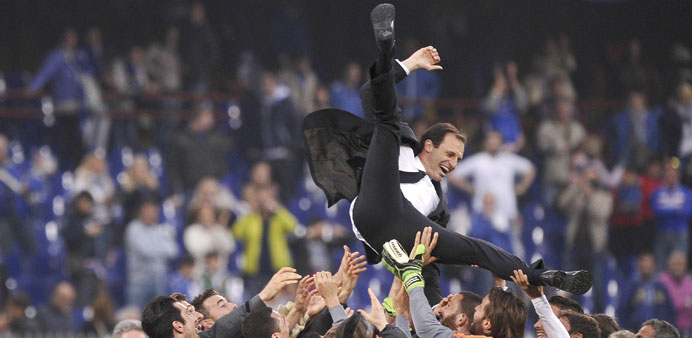The Guardian/London
Champagne corks flew in the Juventus changing room, but few players actually partook. Most preferred to swig from bottles of Gatorade. Together they danced and hugged and sang songs about becoming champions of Italy for the fourth consecutive year. But there would be no confetti, no commemorative T-shirts, not even any immediate plans for a night of drunken excess.
It was a strikingly low-key conclusion to another remarkable league campaign. Juventus’s season had begun, in the words of the defender Leonardo Bonucci, “amidst chaos”, after Antonio Conte resigned on day one of pre-season training. Punches, kicks, eggs and gobs of spit rained down on the car of Max Allegri when he arrived as his replacement.
A great many Juve supporters were furious at the appointment. Allegri was not only a former rival but one who had knowingly baited them during his tenure with Milan – riffing on the two titles that the Bianconeri had stripped from them as a result of the Calciopoli scandal. He had joked that they should count one extra for winning Serie B.
More than that, Allegri was perceived as not good being enough for the role. Sceptical supporters noted how he had been fired by Milan at the start of 2014 with the Rossoneri sat 11th in the table. Few acknowledged his previous successes at the club – from winning the Scudetto in 2011, to securing a third-place finish the following season despite seeing Zlatan Ibrahimovic, Thiago Silva and Alessandro Nesta depart.
How far the narrative has shifted. At the end of the 1-0 victory over Sampdoria which sealed Juve’s Scudetto on Saturday, players gathered around Allegri to throw him up into the air. The club’s president, Andrea Agnelli, felt moved to post on Twitter for only the 17th time in three years. “To take this team in hand on 15 July and lead them to victory again takes balls!” he wrote. “Thanks Max.”
This will be remembered as Allegri’s Scudetto. It was fitting that his team should line up on Saturday in the same 4-3-1-2 formation which he used so often at Milan, but the truth is that the manager has never been dogmatic when it comes to tactics. Allegri’s greatest strength is his pragmatism, a willingness to bend according to circumstances without ever losing sight of his fundamental goal of winning matches.
We saw this in Milan, where he handled himself masterfully in dealings with Silvio Berlusconi. Plucked from the relative obscurity of Cagliari, he was portrayed at first as a puppet who had been brought in to cater to the owner’s whims. Instead, he showed from the outset that he knew how to pick his battles.
Criticised by Berlusconi for appearing on TV looking unkempt, Allegri made sure to comb his hair and straighten his tie before subsequent post-match interviews. But when Berlusconi agitated for Ronaldinho to play more often, the manager resisted – unwilling to risk the balance of his team. The Brazilian was sold in the next transfer window.
In Turin, Allegri’s pragmatism has manifested itself in the way he has adapted his formations. To begin with, he stuck to the 3-5-2 used by Conte, reasoning that this would be easiest for his players after such a disrupted preseason. He was duly accused of bringing nothing new to the table but, as long as the results kept coming, Allegri did not especially care.
It was only the Champions League group stage defeats away to Atlético Madrid and Olympiakos that led him to contemplate a change of course. Needing a win in the return game against the Greek side, Allegri gambled on a switch to a four-man defence. Juve trailed just after the hour mark but eventually won 3-2. Allegri signed off his post-match tweet with a “#fiuuu” (Italian for “phew”) that quickly went viral. It was both a defining moment of his team’s season, and also the one in which his relationship with the Juventus fans finally started to thaw.
Since then, Allegri has chopped and changed formations, adjusting according to opponent but also according to the players available. It is worth remembering that this season’s successes have been achieved despite lengthy absences (some of them ongoing) to players as important as Paul Pogba, Andrea Barzagli, Kwadwo Asamoah and Andrea Pirlo.
Where Conte’s teams played at a constant high tempo, Allegri has taught Juventus how to ease off and conserve energy at the right times. As Maurizio Crosetti put it in La Repubblica on Sunday, “if the most important organ of Conte’s Juve was its [hungry] stomach, then for Allegri’s Juve it is the brain.”
Neither approach is inherently superior to the other. In football, as in many other things, there is more than one way to succeed. Conte’s three consecutive league titles will not quickly be forgotten, and Allegri will neither finish this league season undefeated, as his predecessor did in 2011-12, nor having broken the 100-point barrier as Juve did last year.
Allegri has, however, proven that he belongs at a club of the highest level. He is only the sixth manager ever to win Serie A with two different teams, and the first ever to do so in his first season at each one. His is also the first Juventus side since the advent of three points for a win to claim the title with four games left to spare.
But for now, of course, all attention is on the team’s Champions League semi-final against Real Madrid. It was precisely this prospect which kept the celebrations so muted at the weekend. Juve’s players returned from Genoa on Saturday and withdrew immediately to the hotel where they will remain until first leg.

Juventus’ coach Massimiliano Allegri is thrown in the air by his players at the end of their Serie A match against Sampdoria.
